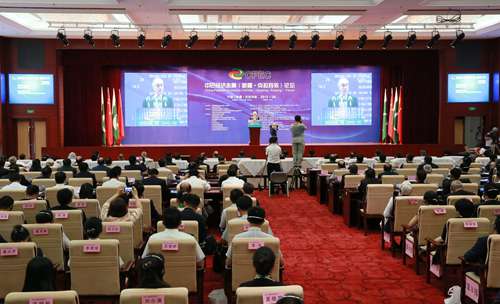 |
|
The city of Karamay in Northwest China's Xinjiang Uygur autonomous region held the 2015 China-Pakistan Economic Corridor Forum on Aug 11. [Photo/Agencies] |
Being the core of the ancient Silk Road, the Xinjiang Uygur autonomous region has been nurtured by unity and mutual trust, equality and mutual benefit, inclusiveness and mutual learning, and win-win cooperation, spirits that were at the heart of the historic trade route.
President Xi Jinping proposed the Silk Road Economic Belt in September 2013, and in March this year the Chinese government released an action plan to implement the initiative, which intends to make Xinjiang an important window for China's opening-up to the West. Xinjiang connects two 1.3-billion-people markets to its East and West, and has the potential to become a vital transport hub in Eurasia after the Silk Road Economic Belt becomes a reality.
Xinjiang, an inclusive intersection of Chinese, Indian, Persian and Greek civilizations, is today home to many ethnic groups, cultures and religions. It is thus a potential trade partner for regions in Eurasia, and Central and South Asia.
Xinjiang has rich natural and labor resources, sound infrastructure and an efficient regional government. Its economy on average has increased at 11.1 percent a year over the past five years, during which its per capita GDP increased from $2,917 to $7,037.
This year marks the 60th anniversary of the founding of the Xinjiang Uygur autonomous region, and the progress it has made during the past 60 years has benefited its people irrespective of the religion and culture they practice.
Also, Xinjiang is restructuring its economy and changing its growth model, because like other Chinese provinces and regions it is committed to environmentally friendly and sustainable development.
China has helped set up the Asian Infrastructure Investment Bank and the Silk Road Fund; it is also strengthening the equipment manufacturing industry and deepening infrastructure construction cooperation with other countries and regions. Xinjiang will try to capitalize on the opportunities created by these initiatives as well as the Silk Road Economic Belt plan to expedite its development as a regional transport, trade, logistics and cultural hub for Central Asia and beyond.
Xinjiang is expected to further improve its transport, energy and telecommunication facilities in the near future, and build an information center for rail and road transport between China and Europe to help smooth the transcontinental transport link.
The region also plans to expedite the construction of some important road transport hubs to form a comprehensive transport network connecting China with Central Asia, the Middle East, South Asia, Europe and Africa. Besides, it will further open up to the outside world through trade links, industrial parks - both at home and abroad - as well as through energy, financial and industrial cooperation.
Another economic boom for Xinjiang is expected to come in the form of the enterprises that are shifting base from East and Central China to the region, especially construction material and equipment manufacturing, textile and garment, and oil and gas processing.
With its agricultural advantages in water sources, soil and abundant sunshine, Xinjiang will expand its trade in agricultural products and cooperation with Central Asian countries and thus secure its food supply.
Moreover, the region will strengthen cultural and educational exchanges with the countries and regions along the Silk Road Economic Belt, which will help deepen mutual understanding.
The region will also strengthen security cooperation with the countries bordering it and thus help maintain regional stability and peace and thwart the designs of separatists, extremists and terrorists. And fighting these evil powers and protecting the security and happiness of the people are the prime responsibility of the entire international community.
The author is Party chief of the Xinjiang Uygur autonomous region. The article is an abridged version of his keynote speech at the opening ceremony of Xinjiang Development Forum in Urumqi on Tuesday.

I’ve lived in China for quite a considerable time including my graduate school years, travelled and worked in a few cities and still choose my destination taking into consideration the density of smog or PM2.5 particulate matter in the region.